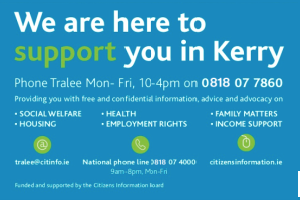 You’ve done the hard work so ‘play a blinder’ in the 2022 State Exams says Guidance Counsellor Billy Ryle who has some last minute advice for candidates…
You’ve done the hard work so ‘play a blinder’ in the 2022 State Exams says Guidance Counsellor Billy Ryle who has some last minute advice for candidates…
The waiting is almost over for about 120,000 Leaving Cert and Junior Cycle students as the exams get under way on Wednesday, June 8.
The Leaving Cert exam returns to the traditional format after two years of calculated and accredited grades.
However, candidates will have additional choice and fewer questions to compensate for Covid-related disruption to the school year.
Minister Norma Foley has said the overall marks this year will be no lower than last year’s record-breaking set of results.
This will be achieved by allowing the State Examinations Commission (SEC) to apply a ‘post-marking intervention’, which will lift all students’ marks, if necessary.
Continued below…
There will also be a copious supply of CAO, Further Education, Apprenticeships, Traineeships and Employment places available for school leavers in a buoyant economy. So, it’s all good news for candidates lining up for the Leaving Cert exam.
The Junior Cycle exam also takes place for the first time since 2019. The Leaving Certificate exams, the Junior Cycle exams and the Leaving Certificate Applied (LCA) exams will run until Tuesday, 28th June, Monday, 20th June and Thursday, 16th June, respectively.
Final Weekend
This is the final weekend for major revision. Stick to your study plan on Saturday and Sunday. Concentrate on subjects being examined during the first week.
As the exams run into the subsequent weeks, the optional subjects are nicely spaced out allowing for study days.
Prioritise
Leaving Cert candidates should prioritise last minute work in English, Home Economics, Engineering, Geography and Mathematics Paper One and get it done by Sunday night.
Likewise Junior Cert candidates should do the same in English, Religious Education, Irish, History, Geography and Maths. On Monday, concentrate on the tips and predictions for subjects being examined the first week. Don’t cram on the days before the exam as this may cause confusion and fatigue.
Alertness
Spent an hour or two on Tuesday skimming over your notes for Wednesday’s exams and leave it at that.
Some relaxed leisure will be more beneficial than spending the day cramming material that you may not recall anyway.
You need a clear and alert mind going into the exams on Wednesday morning and for the duration of the exam period.
Notes
On the evening before each exam subject spend an hour or so looking over your notes so that the important concepts and ideas are fresh in your mind.
Heavy study sessions on the night prior to any paper are not a good idea as you will be exhausted the following morning.
Instead, relax and get a good night’s rest. Put all thoughts of the following day’s exam out of your mind. If you find it difficult to sleep, try a little non-academic reading for a short while.
Personal Materials
Over the next few days check your equipment and assemble your exam materials – black or blue biros, pencils, ruler, eraser, drawing instruments, calculator and so on.
Have at least two biros or fountain pens in case one doesn’t work properly. It’s time, too, to organise your personal needs such as a watch and tissues.
Relaxation
A few nerves are normal on the first day so be prepared to deal with it. A relaxation exercise or maybe a shower to freshen up will do the trick.
Eat a nutritious breakfast as you’ll need the extra reserves of energy. Finally, go through your equipment checklist before leaving home.
Pre-Exam Mode
On Wednesday morning arrive at the exam centre at least a half hour before the exam begins. For all subsequent exams be present about fifteen minutes before the appointed time.
Spend the few minutes before entering the exam centre on your own in peace and quiet. At all costs, avoid groups that are involved in last minute revision. If you need to, use the bathroom before you enter the exam centre.
Be in your seat a few moments before the exam is due to begin. Synchronise your watch with the clock on the wall and use your watch or the clock to help you pace your work.
Exam Centre Check
Check your seat and desk for firmness and stability. A shaky desk will torment you and distract you during the exam.
When the answer book is distributed, fill in the required details and read the directions.
When you receive your question paper read the instructions carefully in case there is any change of format. Don’t be put off by your first glance at the paper. It’s new and it will look unfamiliar at first.
Once the exam begins, keep to your prepared answering plan and address the questions which are asked.
Post-Mortem
If you finish a paper before the time is up, do not leave the exam centre. Recheck your work and extra information may come to you.
Attempt an extra question only when you have thoroughly answered the previous questions. Once an exam is over, spend as little time as possible on a post-mortem. Focus on the next paper and stay in exam mode until you finish your final subject. Remember the Leaving Cert is a marathon rather than a sprint.
When the entire exam is over, forget about it and enjoy your summer. There is no advantage in dwelling on what might have been. Be happy and satisfied that you have done your best.
Exam Results
Leaving Cert results may be issued later than normal this year as the SEC is holding a second set of exams in July for certain categories of students, such as those who experience a close family bereavement, Covid-19 illness and certain other categories of serious illness.
A date for the release of the 2022 Leaving Cert results is likely to be announced shortly. CAO round one offers for college applicants are normally released a few days after the exam results are issued. Good luck to all candidates starting exams next week.
Checklist
• Concentrate on subjects being examined in the first week
• Complete major revision by Sunday night
• In a relaxed study session on Monday concentrate on tips and predictions
• On Tuesday just skim over your revision notes for an hour or two
• Have a clear and alert mind going into each exam
• Arrange the equipment and materials you will need for the exams
• Organise your personal needs such as a watch and tissues
• Spend the few minutes before entering the exam centre in peace and quiet
• Be in your seat a few minutes before the start of each exam
• Check that your seat and desk are firm and steady
• Read the instructions carefully
• Know what to expect but be prepared for the unexpected
• Use all the time available to you
• Once an exam is over, avoid protracted post-mortems
• The exams are a marathon rather than a sprint
• Eat well during the exams when you’ll need lots of energy
• Keep fluid levels high to avoid dehydration
• Take regular aerobic exercise during the exam period
• Exam timetables are available on www.examinations.ie
• Good luck to everybody doing exams.
Billy Ryle is a Career Guidance Counsellor and educational commentator
……………………………………………………………………………………………………………………………………………………………………………………………………………………………………………………………………………………………………………………………………………………………………………………………………………………………………………………………………………………………………















